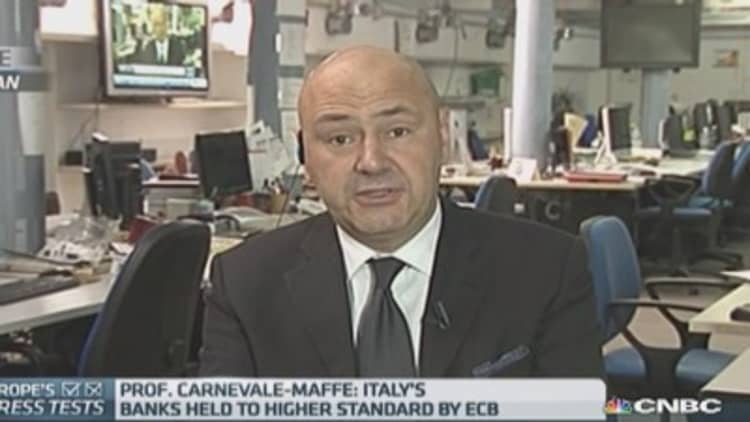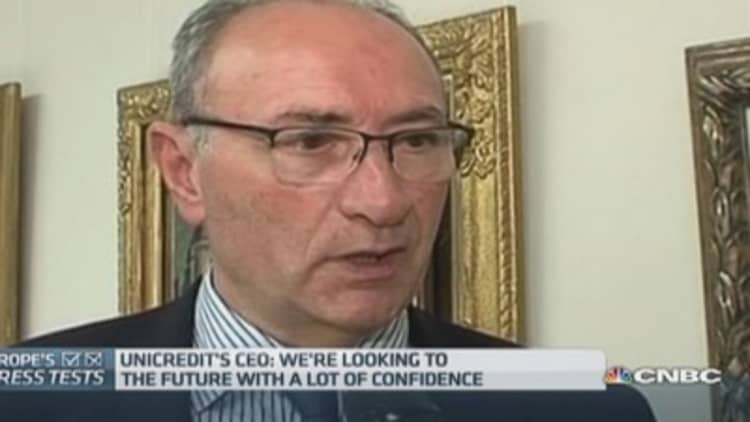
Italy's report card was by far the worst from this weekend's European bank stress tests, with nine of its 15 banks tested failing to reach the levels of capital required.
The country's relationship with European authorities could get increasingly fractious, with the European Commission yet to approve its 2015 budget. And tensions are set to continue as its banks look to raise more capital than any other country to reach European Central Bank (ECB) requirements at a time when the Italian economy is back in recession.
There was a "surgical targeting of Italian banks with asset quality review (AQR) drones (by the ECB)," according to Carlo Alberto Carnevale-Maffe, professor of strategy at Italy's Bocconi University.
"The ECB targeted the banks with the lowest level of transparency and governance, and the highest links with the political system," he told CNBC.
Economy struggling
Unicredit and Intesa Sanpaolo, the country's two biggest lenders, both passed the tests, but some of their smaller counterparts are struggling as the economy stagnates, and the level of sovereign debt on their balance sheets starts to look more worrying.
While household debt levels in Italy are relatively low, its public debt-to-gross domestic product ratio was 134 percent in the second quarter of 2014, compared to 94 percent for the euro zone as a whole.
Federico Ghizzoni, chief executive of UniCredit, told CNBC he was "very satisfied" with his bank's result and added: "For the system in general, the results including what has been done in 2014 is OK."
Ghizzoni predicted there will be an increase in mergers and acquisitions in the Italian banking sector as a result of the tests.
Problems for the world's oldest bank
As a result of the weekend's results, Italy's Monte dei Paschi di Siena, the world's oldest bank which was bailed out by the Italian government in 2012, came out with the largest capital shortfall of any of the 123 covered by the stress tests. It now has to raise 2.1 billion euros ($2.7 billion) within nine months. In trading Monday morning, MPS shares had fallen 15 percent as a result of the tests.
Banca Carige presents the next biggest shortfall in Italy, with a further 814 million euros needed.
Banca d'Italia, Italy's central bank, seemed reasonably confident following the results, partly because the worst-case scenario involved a five-year recession, which they thought was improbable. Fabio Panetta, the bank's deputy governor, described the findings as "reassuring" and "not unexpected."
This is partly because seven of the nine banks have already raised money or sold off assets to correct the capital shortfalls (the ECB tests are based on their balance sheets as of the end of 2013). They are: Banco Popolare, Banca Popolare dell'Emilia Romagna, Banca Popolare di Sondrio, Veneto Banca, Credito Valtellines, Banca Popolare di Milano and Banca Popolare di Vicenza.

Renzi reforms on the way
There are also hopes that Prime Minister Matteo Renzi's program of tax cuts, additional borrowing and sweeping reforms to the labor market may help revive the economy. The plan still needs to be approved by Italy's European counterparts, however, and will involve raising Italy's deficit targets to the 3 percent level allowed by the European Commission.
There is still a danger of "national complacency" around the state of Italy's banking sector, Carnelvale-Maffe argued.
"The adverse scenario is not that adverse – it is missing the risk of deflation. Deflation is already here in Italy, and a GDP decrease is already here."
- By CNBC's Catherine Boyle



